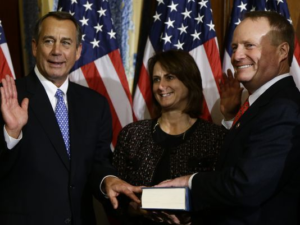The calls for mandating term limits for members of the U.S. House and Senate have become a bit muted in recent years.
That’s fine with me. I’ve never quite understood the notion of requiring public servants to step aside after a certain set time established through federal statute or constitutional amendment.
The issue keeps recurring every so often. It well might again in the 2018 midterm election that will decide every one of 435 U.S. House seats and one-third of the seats in the 100-member U.S. Senate.
I dug up a 2013 article in USA Today that noted that the 113th Congress was the most “inexperienced” in nearly two decades.
As USA Today noted about that Congress: A confluence of factors — from a trio of wave elections, redistricting, divisive primaries to even death — kick off a 113th Congress populated by junior lawmakers in both chambers that challenges the conventional wisdom that Washington politics is dominated by entrenched incumbents.
Nearly two in five lawmakers in the U.S. House, 39%, have served for less than three years, according to data compiled by the non-partisan Cook Political Report. It’s the least experienced House since at least 1995, when an election wave swept the Republicans into power.
Read the rest of the USA Today article here.
That was just four years ago. The turnover on Capitol Hill has continued at about the same pace.
It brings to mind the Congress that took office in 1995. The election the previous year had swept out dozens of incumbents as the Republican insurgents took control of both legislative houses for the first time in 40 years. One of the upstart freshmen that year was a young self-described “recovering lawyer” named Mac Thornberry, who became the Texas Panhandle’s representative.
Thornberry, a Clarendon Republican, is still in the House. He campaigned as a champion of the Contract With America, the GOP platform that pledged a lot of radical changes. One of them was mandated term limits. Thornberry never imposed any such limit on himself; he has voted in favor of every failed attempt to amend the U.S. Constitution to require term limits for members of Congress.
Frankly, I’ve never faulted him for remaining in Congress all this time … even though I detest his general governing philosophy.
Indeed, any member of Congress who does a lousy job or who doesn’t represent his constituents’ interests will hear from them on Election Day. The voters have the power to impose their own brand of term limits on their elected representatives.
Moreover, is inexperience a good thing when it comes to running the federal government? Hmm. Let me think about that.
Oh, yeah. We’ve got a political novice in the White House at this very moment. The president took office after spending his entire professional life seeking to fatten his financial portfolio. He had zero public service experience before taking office. He is learning a hard lesson that governing isn’t nearly the same as running a business empire.
I believe, therefore, that government experience is vital.
The upcoming midterm election is going to turn on a lot of factors. Term limits might return as a top-drawer political issue. Fine. Let’s have that debate. I likely won’t budge from my long-held belief that we already have term limits. We call them “elections.”
***
Here’s what I wrote five years ago about this very issue:
https://highplainsblogger.com/2012/10/term-limits-we-already-have-them/
